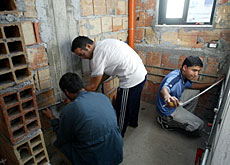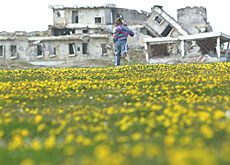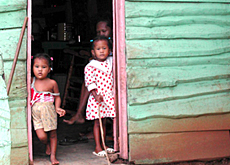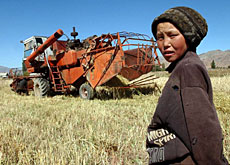Swiss aid democracy in southeastern Europe

The Swiss government says it will continue to fund efforts to strengthen democracy and the economy in southeastern Europe, despite the difficult transition process.
It said it was in Switzerland’s interests to ensure that progress was maintained in Bulgaria, Albania and Macedonia.
The three countries were the focal point of a conference in Zurich devoted to Switzerland’s cooperation with eastern Europe and the Commonwealth of Independent States.
Bern spends more than SFr40 million ($33.2 million) annually in southeastern Europe. Bulgaria, Albania and Macedonia, which was part of the former Yugoslavia, are all former communist countries.
Speaking at the conference, Walter Fust, director of the Swiss Agency for Development and Cooperation (SDC), said the money was “a good investment”.
Migration issues
Fust noted that Switzerland was directly affected by migration from these countries. He said aid could have an impact on migration as well as “open doors” at the economic level.
“The political situation has calmed somewhat but there are many problems that have not been solved,” he told swissinfo.
“The migration of people from the country to the towns and to the West is a huge problem. Efficient aid, even financial, would also limit migration to Switzerland.”
Fust told the annual meeting that the process of transition was far from over, and that many people were disappointed by the lack of progress.
“Democracy and the market economy have brought freedom and opened up possibilities. But many people are not in a position to benefit,” he said.
“In some regions, the situation is even worse than it was under communism,” he added.
Rich and poor
Speakers from Albania, Macedonia and Bulgaria illustrated the difficulties, noting the gulf between rich and poor, and between towns and cities. They also highlighted the ethnic and religious tensions tearing Macedonia apart.
Jean-Daniel Gerber, head of the State Secretariat for Economic Affairs (Seco), said the people of southeastern Europe only stood a chance if there was economic growth.
But he added that he was “very optimistic” about the future of the region. Gerber pointed to the fact that eight former communist countries had now joined the European Union.
He recalled that the transition process for these countries had only begun in 1998 and they no longer needed Swiss assistance.
Gerber said the Swiss government was now helping in another way by contributing SFr1 billion over five years to an EU fund for the ten new member countries.
“We should not forget that countries in eastern Europe have made great progress economically,” he said.
“If you think, for example, that we have been in the field in Africa for 40 or 50 years and that practically nothing has happened, we should not belittle the developments in eastern Europe,” he added.
swissinfo with agencies
“State for the Citizens or Citizens for the State?” was the central theme of this year’s annual conference on Swiss cooperation with eastern Europe and the Commonwealth of Independent States.
The SDC coordinates Swiss development cooperation as well as humanitarian aid in the region.
It employs more than 500 people and has an annual budget of SFr1.2 billion.
Bern spends SFr40 million annually ($33.2 million) on Macedonia, Albania and Bulgaria.
The money contributes towards the transition to democracy and the market economy.
Switzerland is also paying SFr1.2 billion over five years to help the cohesion efforts of the enlarged European Union.

In compliance with the JTI standards
More: SWI swissinfo.ch certified by the Journalism Trust Initiative












You can find an overview of ongoing debates with our journalists here . Please join us!
If you want to start a conversation about a topic raised in this article or want to report factual errors, email us at english@swissinfo.ch.